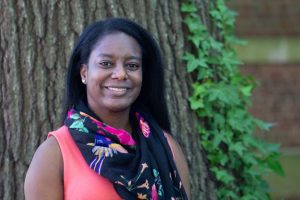Candace Buckner is a seventh-year doctoral candidate in the Ancient Mediterranean Religions track in the Department of Religious Studies. Her specialization is Early Christianity, and her research primarily focuses on biographies written about ancient Egyptian desert monks. She explores how this literature reveals the ways early Christians tackled difficult topics such as race and ethnicity, usage of space, infirmity, and disability. She explores what ancient writings can teach us about contemporary discussions of these topics. Ultimately, she is interested in the ways these texts remain salient for the modern world.

What made you choose UNC when deciding on a program/place to study?
I chose UNC as it was one of the few programs in the country that would allow me to study in my field, Late Ancient Christianity, and prepare me for the rigors of teaching outside of my specialty. Other programs offered the ability to focus on my research but neglected this necessary part of professional development. I also wanted to return south to be closer to family. Accepting this program allowed me to tailor my academic experience, while also maintaining important familial ties.
Tell us about your research (as if you’re explaining it to someone with limited knowledge in your field).
My primary focus is biographies of Egyptian desert ascetics written between 300–800 CE. In particular, I study biographies which are composed in Coptic, the last manifestation of the Egyptian language before the rise of Arabic. I use these texts to answer questions about the culture of the Late Ancient world, including how Coptic Christian authors understood the body, space, race and ethnicity, and the human relationship with the divine. I am especially interested in how these authors adapted and appropriated, or conversely, rejected and repudiated, earlier Greco-Roman models in their discussions of these topics.
How have you built Community as a graduate student at Carolina?
One way that I have created community at Carolina is through participating in Writing Wednesdays at IME. This group has allowed me to interact with students across various disciplines, and introduced me to a vibrant and supportive community of people. The other way that I have created community is by participating in work at the Writing Center, where I served as a Writing Coach for a few years. Through this work, I have met several life long friends. Some of whom have graduated and moved on, but I still talk to at least once a week.
What are you hoping to accomplish with your Carolina degree?
In the future, I hope to become a professor of Early Christian literature and use this platform to both demonstrate the importance of having diverse voices across the humanities, but I also hope to provide scholarship which integrates different theoretical models in literary analysis in antiquity. In doing so, I hope to help modern readers understand how the ancient world can help elucidate modern problems and connect together seemingly different cultures and experiences.
